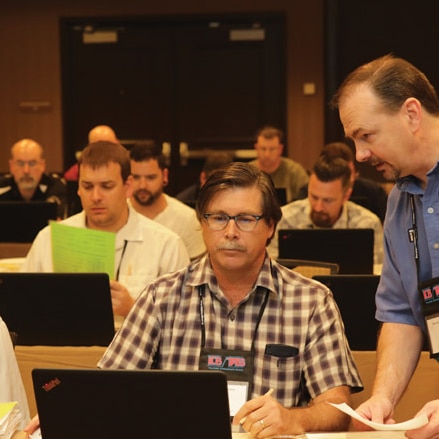
Mechanical and building codes are the Bible that sheet metal workers live by — they protect occupants and property in the buildings they help design, construct and maintain. At the 2017 ICB (International Certification Board) Conference, held May 1-5 in Saint Charles, Missouri, involvement by union sheet metal professionals in code interpretation, proposals, revisions and adoption was the theme of the week.
“Who wrote this?” and “This doesn’t make any sense” have been often muttered by those interpreting codes for projects across the country, and many trades men and women don’t know what they can do to lend their expertise to change it.
“Codes help anything you can drive on a job site,” said Gary Andis, ICB director of certification. “Codes have a minimum requirement, but you can raise the bar with a code change.”
Misty Guard, vice president of PMG Programs at the International Code Council; Chad Beebe, deputy executive director at the American Society for Healthcare Engineering (ASHE); Brian Rogers, regional manager, International Association of Plumbing and Mechanical Officials (IAPMO), also known as the Uniform Mechanical Code Officials; and Henry Green, president/CEO of the National Institute of Building Sciences, spoke during lunch-and-learn sessions aimed at educating attendees and getting them involved.
“Codes and standards are your friends,” Green said. “They facilitate the construction process, level the playing field and lead to predictable, quantifiable, focused outcomes. Don’t think of them as a barrier to getting your project built; they help you achieve it in terms of safety, performance and design intent.”
All voices and opinions can be heard, from apprentices, to experienced 20-year journey persons, to those who work in the field every day, to instructors in the training classroom.
“It’s your voice, your vote, your code,” Rogers said. “It is extremely important to the industry. Anybody who has to deal with providing safe installs— they become involved to make sure the highest level of standards are maintained.”
As professionals dealing with codes created by organizations and government entities every day, sheet metal workers are the eyes, ears, hands and minds behind the life of a code. Does it work? Does it make sense? Is it interpreted correctly? Are the codes updated to stay abreast of the rapidly changing sheet metal industry?
“Codes affect their daily jobs,” Guard said. “At the end of the day, that code will affect how they design systems, test systems, maintain systems.”
The birth and maintenance of a code depends on whether it’s a local code, investigated and updated by a local organization, or an international/national code that is updated on an often three-year cycle through a national organization. The advent and use of technology has made participating on the global stage more possible than ever, but sheet metal workers can also make a large impact in local codes.
“That’s where they’re most affected, and it’s the best way to get introduced to the process that impacts their work,” Rogers said.
It can even start smaller, Beebe added.
“I think the first thing to do is to talk about it with others,” he said. “The main goal is to collaborate. We all have different needs, but we’re all after the same goal. It’s just finding out how all that aligns together.”
Related News
- FRA Issues Grade-Crossing Safety Advisory
- Amtrak To Give SMART-TD Members Holiday Bonuses
- Federal judge orders release of Kilmar Abrego Garcia from immigration detention — General President Coleman responds
- SEPTA Strike Avoided: Strong Agreement Secured
- DC attorney general secures $1.5 million from construction company for wage theft, worker misclassification
- Posthumous Retirement Ceremony Honors Lost Brother
- SMART-TD: Built by Members, Driven by Your Voice
- Conductor, Volunteer Firefighter Injured and Needs our Help
- Local 85 members organize 5K to address mental health, suicide in the construction industry
- FRA Doubles Our Risk By Reducing Track Inspections